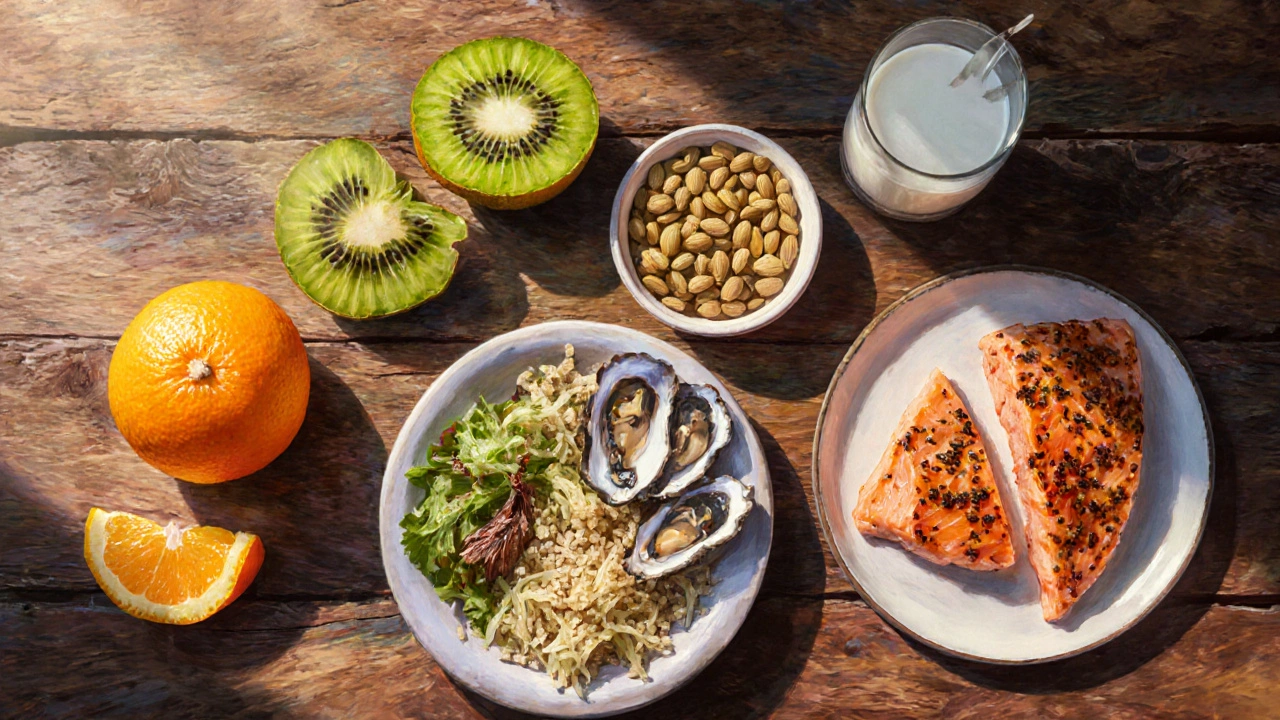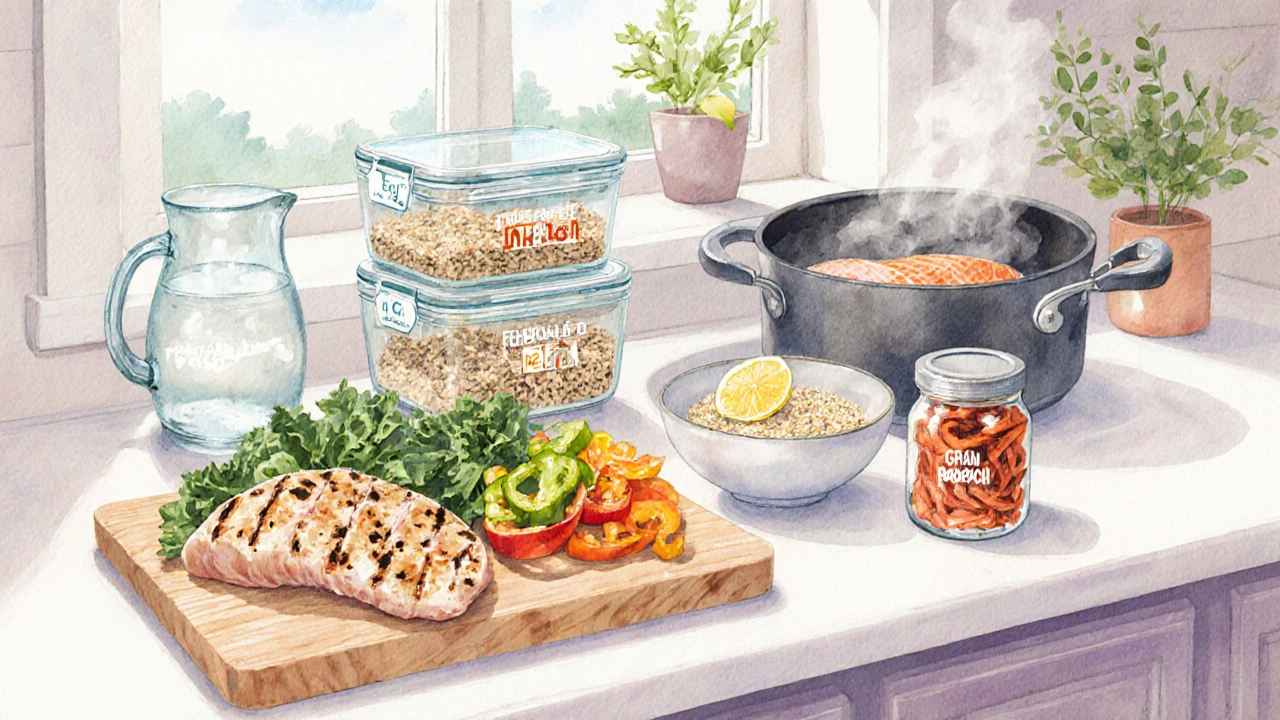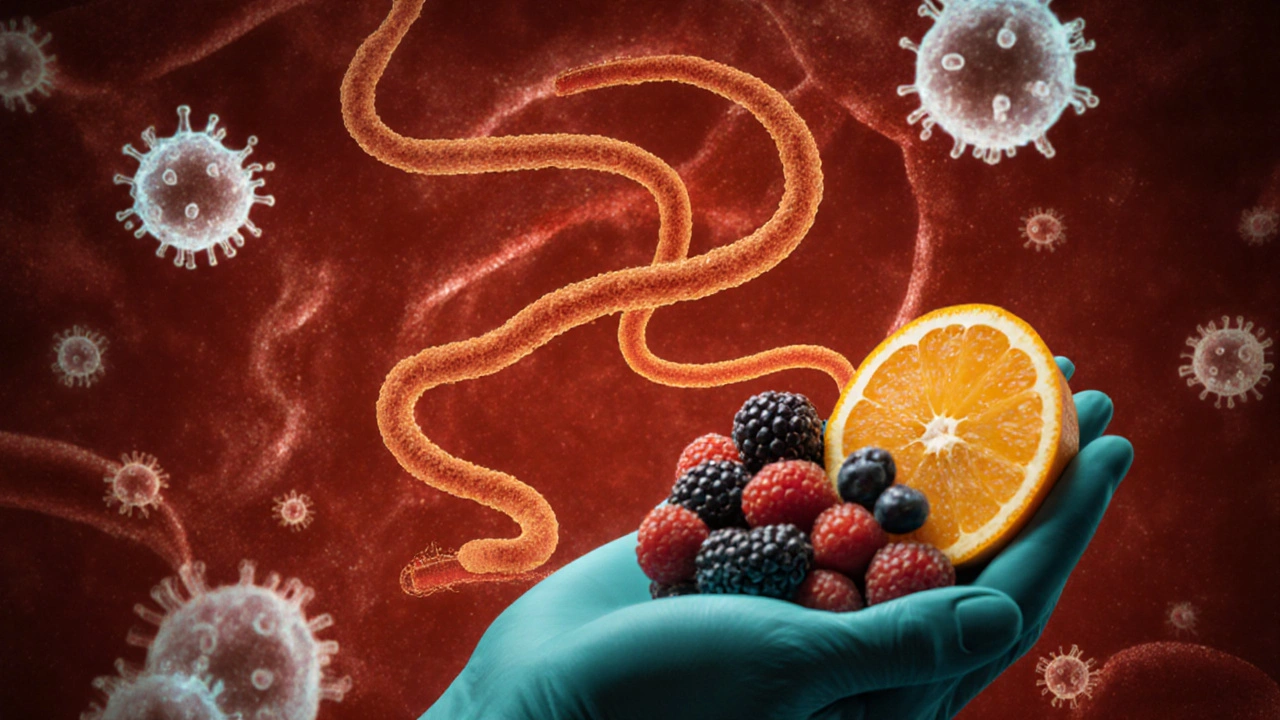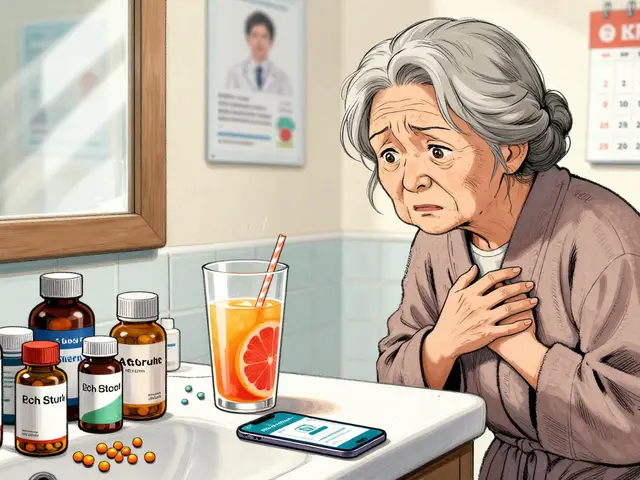Syphilis Recovery Nutrition Calculator
Recommended Daily Intake for Syphilis Recovery
Key Nutrients for Recovery
Vitamin C
Boosts white blood cell function
90 mg/day
Zinc
Essential for DNA synthesis in immune cells
11 mg/day (male) / 8 mg/day (female)
Protein
Provides amino acids for antibodies
1.2 g/kg body weight
Probiotics
Maintains gut barrier, reduces inflammation
Daily probiotic intake
Omega-3s
Calms excess inflammation
500 mg EPA/DHA/day
When a doctor tells you you have Syphilis is a sexually transmitted infection caused by the spirochete Treponema pallidum. The news is stressful, but the good news is that what you eat can tip the scales toward faster healing and fewer complications.
How Syphilis Affects the Body
Syphilis follows three stages-primary, secondary, and tertiary-each with its own set of symptoms. In the early phases the bacterium spreads through the bloodstream, triggering inflammation, fever, and skin rashes. Later, untreated infection can damage the heart, brain, and nerves. Because the pathogen attacks multiple systems, a robust immune system is essential for keeping the bacterial load low until antibiotics finish the job.
Why Nutrition Matters for Immune Defense
Your immune response relies on a steady supply of micronutrients and macronutrients. Vitamins and minerals act as cofactors for white‑blood‑cell activity, while proteins provide the building blocks for antibodies. When you’re fighting an infection, the body’s demand for these nutrients spikes. Skipping meals or loading up on junk food forces the immune system to work harder with fewer tools, slowing down recovery.
Key Nutrients That Speed Up Recovery
Research from the Journal of Clinical Nutrition (2023) shows that patients with higher intakes of certain nutrients clear bacterial infections up to 20% faster. Below are the top five players you should prioritize:
- Vitamin C - boosts white‑blood‑cell function; aim for 90mg/day (≈1orange).
- Zinc - essential for DNA synthesis in immune cells; 11mg/day for men, 8mg/day for women.
- Protein - provides amino acids for antibodies; 1.2g per kg of body weight is a good target.
- Probiotic strains (e.g., Lactobacillus rhamnosus) - maintain gut barrier, reducing systemic inflammation.
- Omega‑3 fatty acids - calm excess inflammation; two servings of fatty fish per week supply about 500mg EPA/DHA.

Foods to Embrace During Treatment
Load your plate with items that naturally pack the nutrients above:
- Fresh citrus fruits, strawberries, and kiwi for VitaminC.
- Lean meats, eggs, and legumes for high‑quality protein.
- Shellfish, pumpkin seeds, and chickpeas for zinc.
- Greek yogurt, kefir, and sauerkraut for probiotics.
- Salmon, sardines, or chia seeds for omega‑3s.
Pair these with whole‑grain breads, brown rice, or quinoa to keep energy steadier and support gut health.
Foods and Habits That Can Hinder Healing
Some tasty choices actually make the immune system work overtime. The table below lays out what to limit:
| Supportive Nutrient | Typical Food Sources | Potentially Harmful Component | Examples to Limit |
|---|---|---|---|
| VitaminC | Citrus, berries, bell peppers | Added sugar | Sodas, sugary snacks |
| Zinc | Oysters, beef, pumpkin seeds | Excess alcohol | Heavy‑handed beer binge |
| Protein | Chicken, tofu, lentils | Trans‑fat | Fried fast‑food meals |
| Probiotic | Yogurt, kimchi, kombucha | High‑sodium processed meats | Salami, pepperoni packs |
| Omega‑3 | Fatty fish, walnuts | Refined carbs | White bread, pastries |
Practical Meal‑Planning Tips
Putting theory into a daily routine is easier when you have a simple framework:
- Start with protein. Choose a 3‑ounce portion of chicken, fish, or beans.
- Add a colorful vegetable side-think red bell pepper or deep‑green kale-to hit VitaminC and antioxidants.
- Include a grain or starch that’s high in fiber-brown rice, quinoa, or sweet potato.
- Finish with a probiotic snack-plain kefir or a small serving of sauerkraut.
- Hydrate with water, herbal tea, or diluted fruit juice; avoid sugary drinks.
Prep in batches on the weekend: grill a tray of chicken, steam mixed veggies, and portion out grains into containers. When you’re low on energy, the ready‑to‑heat meals keep you on track without resorting to fast food.

When Nutrition Alone Isn’t Enough
Diet can boost recovery, but antibiotics-usually a single intramuscular dose of penicillin G-remain the cornerstone of treatment. If you’re allergic to penicillin, doxycycline is an alternative but requires a longer course. Always finish the full prescription, even if symptoms fade early. Nutrition works best alongside medical care, not as a substitute.
Quick Takeaways
- Syphilis stresses the immune system; adequate syphilis diet supports faster bacterial clearance.
- VitaminC, zinc, protein, probiotics, and omega‑3s are the top nutrients for recovery.
- Choose whole foods, stay hydrated, and avoid excess sugar, alcohol, and processed fats.
- Plan meals around protein + colorful veg + fiber‑rich carbs + probiotic snack.
- Finish the prescribed antibiotic regimen; diet is a powerful sidekick, not a replacement.
Frequently Asked Questions
Can a specific diet cure syphilis without antibiotics?
No. Nutrition improves immune function and can shorten recovery time, but antibiotics are required to eradicate Treponema pallidum. Skipping medication risks serious complications.
How long after starting treatment should I notice symptom improvement?
Most patients feel better within a few days to one week, especially if they follow a nutrient‑dense diet. Full serological clearance can take up to three months, so follow‑up testing is essential.
Is it safe to take zinc supplements while on antibiotics?
Generally yes, but high doses (>40mg/day) may interfere with the absorption of certain antibiotics like doxycycline. Stick to food sources or a modest 15‑mg supplement.
What probiotic strains are most helpful during STD recovery?
Lactobacillus rhamnosus GG and Bifidobacterium lactis have the strongest evidence for supporting gut barrier integrity and reducing systemic inflammation, both valuable when the immune system is fighting an infection.
Should I avoid fruit because of sugar?
Whole fruit provides fiber, vitamins, and antioxidants that outweigh the natural sugars. Avoid fruit juices or dried fruit with added sugar; stick to fresh berries, apples, or citrus.






Vinay Keragodi
October 5, 2025 AT 13:27Interesting rundown on the nutrients, especially the emphasis on zinc and vitamin C. I think a lot of people underestimate how protein supports antibody production. Also, the probiotic suggestion is solid – gut health really does influence systemic immunity. If you’re on antibiotics, remember they can also wipe out some good bacteria, so a daily kefir can be a good backup. Overall, a balanced plate can accelerate the recovery timeline.
Cassidy Strong
October 15, 2025 AT 07:03While the article outlines several key nutrients, it neglects to mention the importance of adequate caloric intake; without sufficient calories, even the best micronutrients cannot function optimally, consequently, patients may experience delayed healing.
Anil Karwal
October 25, 2025 AT 00:39Skip the soda, stick to water.
Suresh Pothuri
November 3, 2025 AT 17:15Listen, folks: the body is a battlefield, and you need the right ammo. Vitamin C is your artillery, zinc is the strategist, protein is the infantry, probiotics are the medics, and omega‑3s calm the chaos. If you skimp on any of these, you’re practically inviting the bacteria to take over. Indian diets are rich in spices, but you must also incorporate legumes and fish for the full spectrum. Don’t think you can outrun the infection with just prayers – it’s biology, not mysticism.
Millsaps Mcquiston
November 13, 2025 AT 10:51Simple: eat meat, eggs, and some veggies. That’s it.
michael klinger
November 23, 2025 AT 04:27One must consider the hidden agendas behind pharmaceutical recommendations. The push for certain supplements often aligns with undisclosed corporate interests, which may not serve the patient’s genuine recovery. Nonetheless, a disciplined diet can mitigate the immune burden. The formal tone of this article masks the urgency of questioning authority.
Matt Laferty
December 2, 2025 AT 22:03Let me break this down step by step, because nutrition during infection is not a trivial matter; the immune system operates like a well‑orchestrated symphony, and each nutrient plays a distinct instrument in that performance. First, vitamin C serves as a potent antioxidant, scavenging free radicals that accumulate when the body fights the spirochete, thereby preserving the integrity of white‑blood‑cell membranes. Second, zinc is indispensable for the activity of over 300 enzymes, many of which are directly involved in DNA synthesis and cell‑mediated immunity, which means that without adequate zinc, the proliferation of lymphocytes is severely hampered. Third, protein provides the essential amino acids needed for the synthesis of immunoglobulins, acute‑phase proteins, and cytokines that coordinate the inflammatory response.
Furthermore, the gut microbiome, nurtured by probiotic strains such as Lactobacillus rhamnosus, acts as a barrier against translocation of pathogens, reducing systemic inflammation and allowing the adaptive immune system to focus on the treponemal infection. Fourth, omega‑3 fatty acids, especially EPA and DHA, modulate the production of eicosanoids, shifting the balance from pro‑inflammatory prostaglandins to resolvins that promote healing without compromising pathogen clearance.
Practical application of these principles involves structuring meals around a protein source – think grilled chicken, tofu, or legumes – paired with colorful vegetables that deliver vitamin C and phytonutrients, a whole‑grain carbohydrate for sustained energy, and a probiotic‑rich side such as kefir or fermented vegetables. Hydration cannot be overstated; adequate water intake ensures optimal circulation of immune cells and facilitates the transport of nutrients to sites of infection.
Finally, while diet is a powerful adjunct, it is not a substitute for the prescribed penicillin regimen; antibiotics eradicate the spirochete, and nutrition supports the body in handling the aftermath. Neglecting either component risks prolonged seroconversion or, worse, relapse. In sum, a holistic approach that integrates precise nutrient timing, food quality, and strict adherence to antimicrobial therapy yields the best odds of a swift, uncomplicated recovery.
Genie Herron
December 12, 2025 AT 15:39Feeling helpless? Food helps.
Danielle Spence
December 22, 2025 AT 09:15Honestly, if you’re willing to take an antibiotic, you should also be willing to respect your body by feeding it properly. Ignoring nutrition is just another form of negligence, especially when you’re dealing with a serious STD. This isn’t a suggestion; it’s a responsibility you owe yourself and anyone you might be intimate with.
Dhanu Sharma
January 1, 2026 AT 02:51Whole foods are key, avoid processed junk and stay hydrated.
Edward Webb
January 10, 2026 AT 20:27From a philosophical standpoint, illness reminds us of our bodily fragility, and nutrition becomes an ethical act of self‑care. When we choose nutrient‑dense meals, we acknowledge the interdependence of mind, body, and environment. Thus, the recommendations here are not merely practical but also moral imperatives.
Snehal Suhane
January 20, 2026 AT 14:03Oh great, another “eat your greens” pamphlet – as if leeks alone will beat a spirochete. Maybe try a Michelin‑starred salad next time?
Ernie Rogers
January 30, 2026 AT 07:39We all know the government wants us to buy supplements. Just eat real food.
Eunice Suess
February 9, 2026 AT 01:15Im not sure why people think a smoothie can replace penicillin but hey, try it and see what happenz.
Anoop Choradia
February 18, 2026 AT 18:51It must be noted, with the utmost scholarly rigor, that the pharmaceutic narrative often eclipses alternative nutraceutical pathways, which are, in fact, concealed by covert entities seeking to monopolize health outcomes.